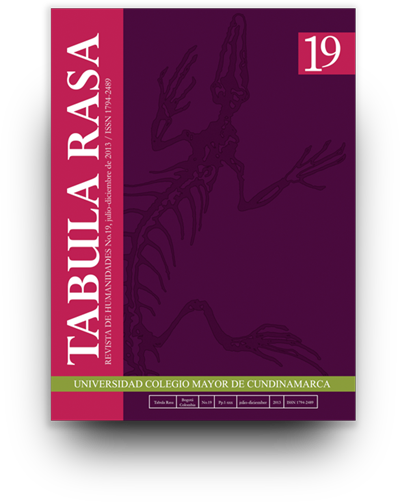Symptoms (decolonial: Grosfoguel as Foucault reader
Síntomas (de)coloniales: Grosfoguel como lector de Foucault
Show authors biography
This article analyzes Ramón Grosfoguel's criticism of Michel Foucault's approach to the concepts of racism and colonialism in his course Defending society (1975-1976). The author analyzes the theoretical assumptions and methodological criteria that underpin Grosfoguel's hermeneutics, based on some assumptions of the genealogy of power and the government of Michel Foucault. The author proposes that this exercise allows establishing the place that Michel Foucault assigns to colonial devices in the conformation of modern government technologies.
Article visits 99 | PDF visits 78
Downloads
Afary, J. y K. Anderson. 2005. Foucault and the Iranian Revolution: gender and the seductions of Islamism. Chicago: The University of Chicago Press.
Agamben, G. 2011. The Kingdom and the Glory. For a Theological Genealogy of Economy and Government. California: Standford University Press.
Alessandri, A. 2009. “The Humanistic Effect: Fanon, Foucault and the Ethics without Subjects” [versión electrónica], Foucault Studies 7: 64-80.
Almond, I. 2007. The New Orientalists: Postmodern Representations of Islam from Foucault to Baudrillard. New York: Tauris.
Bhabha, H. 1994. The Location of Culture. New York: Routledge.
Bourdieu, P. 2005. «¿Qué es hacer hablar a un autor? A propósito de Michel Foucault». En: Pierre Bourdieu, Capital cultural, escuela y espacio social, 9-23, Buenos Aires: Siglo XXI.
Castro-Gómez, S. 2007. «Michel Foucault y la colonialidad del poder». [versión electrónica] Tabula Rasa 6: 153-172.
Castro-Gómez, S. 2010. «Siglo XVIII: El nacimiento de la biopolítica”. [versión electrónica] Tabula Rasa. 12: 31-45.
Castro-Gómez, S. 2010. «Michel Foucault: Colonialismo y geopolítica». En: Ileana Rodríguez y Josebe Martínez, Estudios trasatlánticos coloniales. Narrativas comandosistemas-mundo: colonialidad modernidad, 271-292, Madrid: Anthropos.
Cowan, R. 2010. “Re-Orientalism: German Indology Studies Beyong Foucault and Gadamer”. The Comparatist 34: 47-113.
Crampton, J. y E. Stuart (eds.). 2007. Space, Knowledge, and Power: Foucault and Geography. Burlington: Ashgate Publishing Co.
Derrida, J. 1995. «Ser justo con Freud» La historia de la locura en la historia del psicoanálisis, AEN 53, 15: 225-254.
Eribon, D. 1995. Michel Foucault y sus contemporáneos. Buenos Aires: Nueva Visión.
Feder, E. 2007. Family Bonds: Genealogies of Race and Gender. Nueva York: Oxford University Press.
Foucault, M. 1977. “Nietzsche, genealogy, history”. En: Michel Foucault. Language, Counter-Memory, and Practice. Selected essays and Interviews. 139-164, Nueva York: Cornell University Press.
Foucault, M. 1979. «L’esprit d’un monde sans esprit». En: Claire Briere y Pierre Blanchet, Iran: la Révolution au nom de Dieu, 227-241. París: Seuil.
Foucault, M. 1998. Genealogía del racismo. La Plata: Altamira.
Foucault, M. 1999. Historia de la sexualidad 1. La voluntad de saber. México: Siglo XXI.
Foucault, M. 2008. Defender la sociedad. Curso en el Collège de France (1975-1976).
Buenos Aires: Fondo de Cultura Económica.
Foucault, M. 2008. El poder psiquiátrico. Curso en el Collège de France (1973-1974). Buenos Aires: Fondo de Cultura Económica.
Foucault, M. 2009. Seguridad, territorio y población. Curso en el Collège de France (1977- 1978). Buenos Aires: Fondo de Cultura Económica.
Foucault, M. 2013. «La inquietud por la verdad». En: La inquietud por la verdad. Escritos sobre la sexualidad y el sujeto, 239-256. Buenos Aires: Siglo Veintiuno.
Grosfoguel, R. 2012. «El concepto de «racismo» en Michel Foucault y Frantz Fanon: ¿teorizar desde la zona del ser o desde la zona del no-ser?» [versión electrónica]. Tabula Rasa 16 (2012), 79-102.
Mader, M. 2011. “Modern Living and Vital Race: Foucault and the Science of Life” [versión electrónica]. Foucault Studies 12: 97-112.
Racevskis, K. Otoño, 2005, “Edward Said and Michel Foucault: Affinities and Dissonances,” Research in African Literatures 36 (3): 83-97.
Stoler, A. 1995. Race and the Education of Desire. Foucault’s History of Sexuality and the Colonial Order of Things. Durham: Duke University Press.
Said, E. 1990 [1978]. Orientalismo. Madrid: Libertarias.
Said, E. 2004 [1993]. Cultura e imperialismo. Barcelona: Anagrama.
Van Gulik, R. 1996. Sexual life in Ancient China: a preliminary survey of Chinese Sex and Society from 1500 BC till 1644 AC. New York: Barnes & Noble Books.




